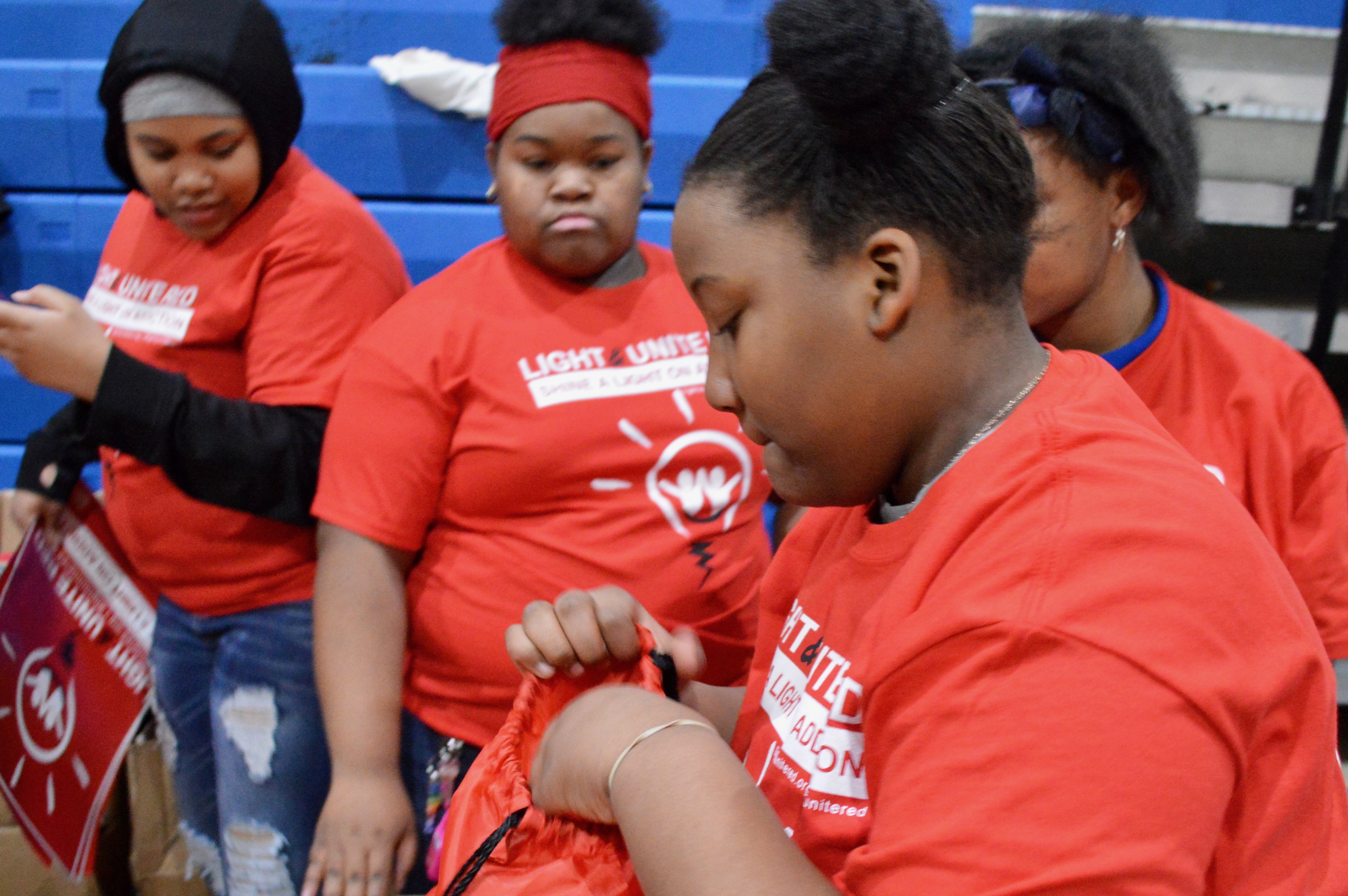by Ana Martinez-Ortiz

Mary Ousley, a teenage ambassador for Light & Unite Red, hands out resource bags. (Photo by Ana
Martinez-Ortiz)
A few weeks ago, Mary Ousley, 15, decided to join Light
& Unite Red, an annual campaign to reduce and prevent substance
abuse started by Milwaukee County’s Behavioral Health Division.
Her
involvement was in part due to her mother, who used to smoke marijuana,
but has now been clean for eight years.
“If my mom can do it, I know other people can do it,” said Mary, a student at Bradley Tech High School.
The campaign focuses on educating people on the dangers of
substance abuse while also connecting them with treatment and
preventive options. BHD aims its efforts at youth since addiction often
starts young. This year, BHD recruited youths such as Mary to advocate
against substance abuse among their peers.
Last week, BHD coordinated several events to mark National
Drug and Alcohol Facts Week, which started Tuesday, Jan. 22. On
Thursday, BHD held a dance-a-thon and community wellness fair at the COA
Goldin Center, 2330 W. Burleigh St., where attendees could dance, enter
raffles and play games such as Jeopardy.
Almost every aspect of the program was designed to
“shatter the myth” about substance use, according to BHD prevention
coordinator Nzinga Khalid, who chairs the Light & United Red
committee. The committee focuses on all dangerous substances. The
Milwaukee County Substance Abuse Prevention coalition focuses on
preventing and reducing marijuana use among teens and reducing
prescription drug overdoses. Other groups target alcohol use or
synthetic marijuana such as K2 and Spice.

Nzinga Khalid (center) and her co-workers hit the dance floor for health and wellness. (Photo by Ana Martinez-Ortiz)
In addition to organizing events, Light & United Red
also utilizes social media to provide the facts about different
substances.
“It’s all about getting that information in the hands of the kids and families,” said Khalid.
The teenage ambassadors, such as Mary, also posted on
social media. When they joined the team, the ambassadors researched
particular topics based on what they are seeing in their community.
For
example, if they are concerned about alcohol abuse, their research and
posts targeted that issue.
Mary focused on drugs such as marijuana and heroin. She
talked to her friends and family, specifically her younger brother,
about how substance use affects brain development. Not everybody
appreciated her posts, she said, adding that teens don’t always care.
“I can’t control anyone’s opinion on what they think
narcotics and drugs can do to them, because that’s not me,” Mary said.
“But I can try to help.”
Charles Clark, 16, said he hasn’t noticed substance abuse
problems among his peers. The Washington High School student has been
coming to COA since he was a child. He attends most of the events COA
hosts.
A lot of people may not recognize substance abuse because
it’s changed so much, according to Dylan Keller, a business development
associate at Starting Point, an agency that teaches schools and families
about substance abuse prevention.
“Five years ago, we beat tobacco,” Keller said. “It felt
like it was just not in high schools anymore, and then came along these
vape pens and JUULs.”
Keller was formerly a high school teacher at West Allis
Central High School, but he joined Starting Point a year ago after
realizing how much substance abuse has increased. He wanted to educate
people, especially teachers, on how to recognize tobacco, drug and
alcohol use.
Teachers don’t even know what to look for anymore because
vape pens look like actual pens, Keller said. He added that people are
often misinformed about the amount of tobacco in an e-cigarette pod. One
JUUL pod has the same amount of tobacco as a pack of cigarettes, Keller
noted.
Opioid addiction can also start at a young age. When a
student-athlete is injured he or she may be prescribed pain medication,
which can lead to dependence. However, Keller noted that substance abuse
can decrease.
“It takes … people knowing what this stuff is, knowing
what it does to your body and what it does to a developing brain,”
Keller said.

No comments:
Post a Comment